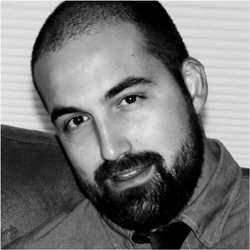To complete the ritual, Nicky stood and took another drag of the joint. When he exhaled, the smoke rose, curling up into the night sky, and with it a part of him that savored lying in an open field drinking the stars from a summer evening. He passed the joint to me and I did the same, exhaling deeply, our vaporous breath searching for escape in the elusive sky. Accomplices. We had a lot to leave behind so we let a little bit of ourselves fly free.
Around midnight, when the moon centered in the space above our position, I reclined on a bed of leaves, swaddled in my sleep sack. I listened. The snap of the fire. The slosh of Nicky draining his drink. The scratch of a lighter and the push of air bending the treetops.
Nicky began a monologue about the land, continually returning to its pre-human form despite our interference. Control is lost, he said, which is control in itself. Vegetation sprouts randomly in this earth. Erosion and maple trees round the stepped corners, roots gnawing and pinching away like a fist closing in the mud.
I told Nicky goodnight and cozied up to the fire.
“In a month,” he slurred, “many of these trees will be bare, their naked branches reaching out to the sun during the day and stars at night, waiting for the quiet of the snows.”
Suddenly he was vomiting into the fire, a purple jet of puke.
Weasel barked.
I was not surprised.
This was routine.
I laughed with a grimace.
“Shit, man,” he said, “Goddamn!” and wiped his lips and chin with his sleeve.
In the morning we woke to fingers of light poking through the forest.
“What do you say we go to the bagel shop for breakfast,” Nicky said.
“Nah,” I replied.
He stretched his arms and scratched the unruly nest of golden curls atop his head. He eyed the chunky splattering of food and wine near his pillow.
“How come you never want to go to breakfast with me?” he asked.
“I guess I’m not hungry,” I said, petting Weasel with one hand and separating the coals in the fire with a stick. “I digested my dinner.”
Nicky mumbled something I couldn’t understand and together we packed up and walked home in silence. He seemed simultaneously offended and apologetic.
“Hike tonight?” he asked as we parted ways.
“Sure,” I said.
That evening, I ascended his porch steps, hoping the dust had settled.
“I see you’re feeling fine,” I said.
“Glad we could do this again.” He handed me a folded page from his journal:
And when I die
Don’t bury me at all.
Just pickle my bones
In alcohol.
Put a bottle of wine
At my feet and my head
And if I don’t rise
You’ll know I’m dead.
I refolded the paper and slid it into Nicky’s shirt pocket. I clapped my hand on his shoulder, unsure what to say.
Soon we were rambling up the terraced hill again through the black night.
Without flashlights our pupils enlarged and adjusted perfectly.
We followed our feet, the stony trail to the water tower mapped across our minds. I looked downhill through the woods, smooth maple trunks playing peek-a-boo with the village lights, the night air tangy and wet in the almost-winter woods.
At the water tower we sat on a rock bench and gazed at the village below, passing a jug of good ole Naples hooch between us. Tractor-trailers passed through town silently – floating light-bulb rectangles like display cases about to illuminate the unknown – and then disappeared between hills, beyond the acres of vineyards.
“Yessir.”
“Mmm, hmm.”
A truck shifted gears leaving town.
After a time we wandered into the woods, taking the long way home.
We trickled downhill like rainwater, slip-surfing on loose shale that clattered as we passed.
Bullfrogs burped like bubbling mud in a nearby bog.
We paused in the middle of the vineyard and craned our necks upward for shooting stars and the constellations that told us this was home.
 Thomas N. Mannella III earned a B.A. in writing from St. Lawrence University and a masters from St. John Fisher College, both in New York. He currently teaches English and Environmental Literature in Naples, NY, where he lives with his wife and sons around the corner from the house he grew up in.
Thomas N. Mannella III earned a B.A. in writing from St. Lawrence University and a masters from St. John Fisher College, both in New York. He currently teaches English and Environmental Literature in Naples, NY, where he lives with his wife and sons around the corner from the house he grew up in.